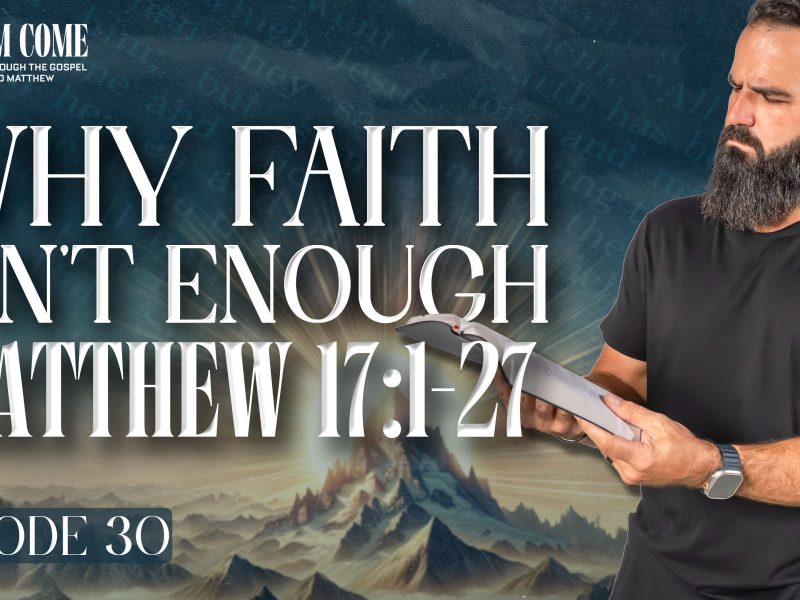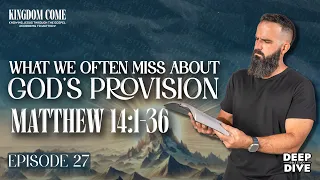About This Project
Do you grapple with the concept of slavery in the Bible?
In this episode, we unravel the layers of metaphorical significance surrounding slavery in Scripture, highlighting how it serves as a lens through which we can understand the human condition and God’s redemptive plan.
Take a deep dive into the profound spiritual truths about slavery revealed in Scripture and discover how they shape our understanding of our identity in Christ.
Whether you’re a believer seeking spiritual insights or someone exploring the Bible, this episode sheds light on the beauty of reading God’s Word redemptively through the lens of the Gospel.
May this Bible Study inspire you to live in the liberating Truth of Jesus Christ.
Key Points:
• Understanding Biblical Slavery: Delve into the nuanced portrayal of slavery in the Bible, recognizing its metaphorical significance and its role in conveying larger truths about humanity.
• Reading the Torah Redemptively: Explore how to interpret the Torah in a redemptive light, uncovering spiritual truths about identity and liberation in Christ.
• Exploring Spiritual Insights: Take a deep dive into Scripture to uncover profound insights about slavery, its implications, and its relationship to our identity in Christ.
• Metaphorical Significance: Recognize how slavery in Scripture serves as a metaphor for bondage to sin and the human condition.
• Freedom in Christ: Understand the transformative power of the Gospel in liberating believers from the bondage of sin and offering true freedom.
• Servitude and Freedom in the Covenant Community: Examine the dynamics of servitude within the Covenant Community, distinguishing it from slavery outside of this context.
• Comparative Analysis: Contrast the societal structures of ancient civilizations with the biblical foundation laid out for humanity, emphasizing the liberating principles found in Scripture.
• God as the Ultimate Liberator: Reflect on God’s role as the liberator throughout Scripture, juxtaposed with sin as the great enslaver.
• Implications for Modern Living: Apply the lessons learned from Scripture to contemporary life, striving to live in the freedom found only in Christ.
• Seeking Spiritual Growth: Embrace the opportunity for spiritual growth and deeper understanding of Biblical principles through the exploration of complex topics like slavery in Scripture.
☑️ You can partner with us to get the message out with a one-time gift at Tim Hatch Live Support OR on the Cash App with cashtag: $timhatchlive
💥 Become a monthly partner and enjoy loads of exclusive channel perks at Tim Hatch Live Patreon
✳20% of all giving will be tithed back out to The American Bible Society and Project Rescue.
Start [0:00]
▶ Introduction [1:38]
▶ Slavery and History [5:28]
▶ Slavery and Freedom [6:58]
▶ Controlling influences by which you may be dominated [11:13]
▶ Creation is Enslaved [15:18]
▶ God is a Liberators [18:15]
▶ Jesus Liberates [19:14]
▶ Slaves to Sin [24:05]
▶ We are servants, not simply people who serve [27:48]
▶ How to read Torah redemptively [30:17]
▶ Interpreting Torah’s slavery laws [35:00]
▶ How to experience true freedom [39:32]
▶ New Testament Commands [40:32]
▶ 10 Facts About Greek and Roman Slavery [43:05]
▶ Which society had a better foundation: the Bible or America? [44:56]
▶ The Bible’s Emancipation Proclamation, Philemon 15-19 [45:36]
▶ Conclusion [49:15]
Slavery and History
- Though in a different moral category, had the Torah banned indentured servitude, it would have increased, not decreased, poverty. For many Europeans as recently as the eighteenth century, indentured servitude was the primary way to escape poverty. Around half of European immigrants to the thirteen American colonies before the establishment of the United States in 1776 came as indentured servants. According to Berkeley historian Christopher Tomlins, of the approximately 450,000 Europeans who came to the American colonies voluntarily, virtually half came as indentured servants.
Slavery and Freedom
- Total Freedom is an illusion.
- “You shall be like God.”
- Sin brings shame and fear.
- Hebrews 2:14–15 (ESV) Since therefore the children share in flesh and blood, he himself likewise partook of the same things, that through death he might destroy the one who has the power of death, that is, the devil, 15 and deliver all those who through fear of death were subject to lifelong slavery.
Slaves of What?
- 2 Peter 2:19 (ESV) They promise them freedom, but they themselves are slaves of corruption. For whatever overcomes a person, to that he is enslaved.
“Whatever controls us is our lord. The person who seeks power is controlled by power. The person who seeks acceptance is controlled by [acceptance]. We do not control ourselves. We are controlled by the lord of our lives.” Rebecca Pippert, Out of the Saltshaker
Slaves of What?
- Romans 6:15–18 (ESV) What then? Are we to sin because we are not under law but under grace? By no means! 16 Do you not know that if you present yourselves to anyone as obedient slaves, you are slaves of the one whom you obey, either of sin, which leads to death, or of obedience, which leads to righteousness? 17 But thanks be to God, that you who were once slaves of sin have become obedient from the heart to the standard of teaching to which you were committed, 18 and, having been set free from sin, have become slaves of righteousness.
Creation Enslaved
- Romans 8:18–23 (ESV) For I consider that the sufferings of this present time are not worth comparing with the glory that is to be revealed to us. 19 For the creation waits with eager longing for the revealing of the sons of God. 20 For the creation was subjected to futility, not willingly, but because of him who subjected it, in hope 21 that the creation itself will be set free from its bondage to corruption and obtain the freedom of the glory of the children of God. 22 For we know that the whole creation has been groaning together in the pains of childbirth until now. 23 And not only the creation, but we ourselves, who have the firstfruits of the Spirit, groan inwardly as we wait eagerly for adoption as sons, the redemption of our bodies.
God Liberates
- Exodus 3:8 (ESV) and I have come down to deliver them out of the hand of the Egyptians and to bring them up out of that land to a good and broad land, a land flowing with milk and honey, to the place of the Canaanites, the Hittites, the Amorites, the Perizzites, the Hivites, and the Jebusites.
- Exodus 8:1 (ESV) Then the Lord said to Moses, “Go in to Pharaoh and say to him, ‘Thus says the Lord, “Let my people go, that they may serve me.
- Deuteronomy 5:6 (ESV) “ ‘I am the Lord your God, who brought you out of the land of Egypt, out of the house of slavery.
Jesus Liberates
- Luke 4:18–19 (ESV) “The Spirit of the Lord is upon me, because he has anointed me to proclaim good news to the poor. He has sent me to proclaim liberty to the captives and recovering of sight to the blind, to set at liberty those who are oppressed, 19 to proclaim the year of the Lord’s favor.”
- John 8:31–33 (ESV) So Jesus said to the Jews who had believed him, “If you abide in my word, you are truly my disciples, 32 and you will know the truth, and the truth will set you free.” 33 They answered him, “We are offspring of Abraham and have never been enslaved to anyone.
- How is it that you say, ‘You will become free’?”
- John 8:34–36 (ESV) Jesus answered them, “Truly, truly, I say to you, everyone who practices sin is a slave to sin. 35 The slave does not remain in the house forever; the son remains forever. 36 So if the Son sets you free, you will be free indeed
- Galatians 5:1 (ESV) For freedom Christ has set us free; stand firm therefore, and do not submit again to a yoke of slavery.
- Hebrews 2:14–15 (ESV) Since therefore the children share in flesh and blood, he himself likewise partook of the same things, that through death he might destroy the one who has the power of death, that is, the devil, 15 and deliver all those who through fear of death were subject to lifelong slavery.
Slaves to Sin:
- Galatians 4:8 (ESV) Formerly, when you did not know God, you were enslaved to those that by nature are not gods.
- Psalm 19:13 (ESV) Keep back your servant also from presumptuous sins; let them not have dominion over me! Then I shall be blameless, and innocent of great transgression.
“Freedom isn’t just unconstrained choices without boundaries, but rather finding the kinds of boundaries that liberate us to be fully alive.” (Tim Keller, Reason for God, Pg 47-50)
We ARE servants, NOT simply people who serve.
- Leviticus 25:55 (ESV) For it is to me that the people of Israel are servants. They are my servants whom I brought out of the land of Egypt: I am the Lord your God.
- Matthew 20:26–28 (ESV) It shall not be so among you. But whoever would be great among you must be your servant, 27 and whoever would be first among you must be your slave, 28 even as the Son of Man came not to be served but to serve, and to give his life as a ransom for many.”
- Romans 1:1 (NLT) This letter is from Paul, a slave of Christ Jesus, chosen by God to be an apostle and sent out to preach his Good News.
- James 1:1 (NLT) This letter is from James, a slave of God and of the Lord Jesus Christ. I am writing to the “twelve tribes”—Jewish believers scattered abroad. Greetings!
Read Torah Redemptively
The Law is a shadow of things to come…
- Hebrews 10:1 (ESV) For since the law has but a shadow of the good things to come instead of the true form of these realities, it can never, by the same sacrifices that are continually offered every year, make perfect those who draw near.
How to Read Torah Redemptively
Pay the worker!
- Deuteronomy 25:4 (ESV) “You shall not muzzle an ox when it is treading out the grain.
- 1 Corinthians 9:8–11 (ESV) Do I say these things on human authority? Does not the Law say the same? 9 For it is written in the Law of Moses, “You shall not muzzle an ox when it treads out the grain.” Is it for oxen that God is concerned? 10 Does he not certainly speak for our sake? It was written for our sake, because the plowman should plow in hope and the thresher thresh in hope of sharing in the crop. 11 If we have sown spiritual things among you, is it too much if we reap material things from you?
Torah’s Slavery Laws:
Slavery is self-surrender to someone else for one’s own protection and benefit WITHIN the Covenant Community.
In the Covenant Community:
- Exodus 21:2 (ESV) When you buy a Hebrew slave, he shall serve six years, and in the seventh he shall go out free, for nothing.
- Leviticus 25:39–40 (ESV) “If your brother becomes poor beside you and sells himself to you, you shall not make him serve as a slave: 40 he shall be with you as a hired worker and as a sojourner.
- He shall serve with you until the year of the jubilee.
Slavery is self-surrender to someone else for one’s own protection and benefit WITHIN the Covenant Community.
OUTSIDE the Covenant Community:
- Leviticus 25:45–46 (ESV) You may also buy from among the strangers who sojourn with you and their clans that are with you, who have been born in your land, and they may be your property. 46 You may bequeath them to your sons after you to inherit as a possession forever. You may make slaves of them, but over your brothers the people of Israel you shall not rule, one over another ruthlessly.
Only in the freedom God gives people can people ever truly experience freedom.
What about New Testament Commands?
- Ephesians 6:5–8 (ESV) Bondservants (doulos), obey your earthly masters with fear and trembling, with a sincere heart, as you would Christ, 6 not by the way of eye-service, as people-pleasers, but as bondservants of Christ, doing the will of God from the heart, 7 rendering service with a good will as to the Lord and not to man, 8 knowing that whatever good anyone does, this he will receive back from the Lord, whether he is a bondservant or is free.
- Colossians 3:22–24 (ESV) Bondservants, obey in everything those who are your earthly masters, not by way of eye-service, as people-pleasers, but with sincerity of heart, fearing the Lord. 23 Whatever you do, work heartily, as for the Lord and not for men, 24 knowing that from the Lord you will receive the inheritance as your reward. You are serving the Lord Christ.
What about New Testament Commands?
- Ephesians 6:9 (ESV) Masters, do the same to them, and stop your threatening, knowing that he who is both their Master and yours is in heaven, and that there is no partiality with him.
- Colossians 4:1 (ESV) Masters, treat your bondservants justly and fairly, knowing that you also have a Master in heaven.
10 main facts about Greek and Roman Slavery:
- Slaves were not identified by appearance or clothing.
- Slaves shared cultural and religious traditions with their owners.
- Education was encouraged for slaves.
- Functioned in highs position in the household – managers, accountants, tutors, sea captains, physicians.
- The bottom of society were free persons who had to find work every day with no certainty of employment.
- Slaves owned property (including other slaves). They could accumulate funds to secure their freedom.
- No laws prohibited the public assembly of slaves from all classes.
- Slaves had families of their own and were not considered part of the owners “Family”.
- Slaves often sold themselves willingly to climb socially or obtain special government positions.
- The majority were set free at age 30 and were made citizens of Rome.
Which Society had a better foundation?
- The Bible (2500 B.C. / 60 A.D.)
- Exodus 21:16 (ESV) “Whoever steals a man and sells him, and anyone found in possession of him, shall be put to death.
- 1 Timothy 1:8–10 (ESV) Now we know that the law is good, if one uses it lawfully, 9 understanding this, that the law is not laid down for the just but for the lawless and disobedient, for the ungodly and sinners, for the unholy and profane, for those who strike their fathers and mothers, for murderers, 10 the sexually immoral, men who practice homosexuality, enslavers, liars, perjurers, and whatever else is contrary to sound doctrine,
Fugitive Slave Act of 1850 (America):
- If you didn’t return a fugitive slave you were liable,
- It also made the federal government responsible for finding, returning and trying escaped slaves.
The Emancipation Proclamation:
- Philemon 15–19 (ESV) For this perhaps is why he was parted from you for a while, that you might have him back forever, 16 no longer as a bondservant but more than a bondservant, as a beloved brother—especially to me, but how much more to you, both in the flesh and in the Lord. 17 So if you consider me your partner, receive him as you would receive me. 18 If he has wronged you at all, or owes you anything, charge that to my account. 19 I, Paul, write this with my own hand: I will repay it—to say nothing of your owing me even your own self.
What Can We Conclude:
- God is a liberator.
- The great enslaver is sin.
- Through the Redemptive work of God – slavery is curtailed and eventually abolished.
- ONLY in Christ, through His redemptive community, do we truly experience freedom.
Questions to Consider:
- Exploring the concept of being enslaved to sin, as mentioned in 2 Peter 2:19, what are some contemporary examples of modern-day enslavements, and how can Christians resist the allure of worldly influences that seek to control and dominate our lives?
- Reflecting on the Biblical narrative of liberation, particularly in passages like Exodus 3:8 and Luke 4:18-19, how does God’s redemptive plan offer hope and deliverance from various forms of bondage, and how can we apply these principles in our lives today?
- In light of the New Testament teachings on servanthood and freedom, as seen in Ephesians 6:5-9 and Galatians 5:1, how can Christians reconcile the concept of being servants of Christ with the world’s notions of freedom, and what implications does this have for our daily lives and relationships?
⬇️ Tim Hatch Live ⬇️
🎙 The Deep End dives deeper into Faith, Politics, Bible, & the world, Tues 7:30p & on your favorite podcast app
📖 Deep Dive Bible Study Kings of Compromise, Weds 7:30p
❓10 Questions with Tim, Q&A segment providing answers, LIVE 1st Thurs, Noon
👉 Ask Anything email ask@timhatchlive.com
🔵 WATCH MORE
🔵 BOOKS
🔵 SWAG
🔵 RUMBLE
🔵 FACEBOOK
🔵 TWITTER
🔵 INSTAGRAM
🔵 TIKTOK










No Comments